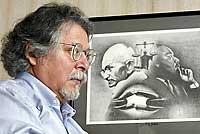 |
 |
 |
|
|
Sunday, April 4, 2004 Page 2 of 5 That means McKean would have cleared about $50,000 a year for public-defense work. He says he used that money to pay overhead for his subcontractors and his private practice. "He was obviously making money off of me," Romero says. "I didn't care because I wanted to start a practice in Grant County, and that was a good way to do it." But it didn't take long for McKean to wonder about his new hire. Romero didn't prepare legal memos or trial briefs. He "didn't seem to have a clue" how to do legal research, McKean says. And he frequently missed appointments with clients, according to Susan Wicks, who worked as Romero's secretary at the time. "You never knew his comings or goings," Wicks says. "I had secretaries from courts calling, saying, 'Where is Mr. Romero?' " In a rape case that still haunts him, McKean says Romero ignored his entreaties to have a private investigator pursue leads that might have undermined the state's case. To this day, McKean wonders if the defendant, who is serving life in prison, is innocent. Says McKean of Romero's work: "I was scared to death."
BOTH SIDES OF THE LAW
His passion, he says, is to help people. He pulls a ledger from his desk and points to a donation he made: Red Cross. $100. "And I saw another one in here that I was proud of," he says, riffling through the book. "Hold on. I've got to stroke my ego here." He finds it: Food bank. $100. "That's what I do," he says. "That is what I do, my friend." For weeks, Romero balked at being interviewed, but when he talks, he talks for 5½ hours — about his history with drugs, his recovery, his assault conviction, his tax liens and debts, his love of football and kites, and how he's being picked on by the Washington State Bar Association because he's Hispanic and a bachelor. He pulls out a letter — a bar complaint against him — and points to profane language that a client attributed to him. Does that sound like something I'd say? he asks. Moments before, he had used the very same profanity. Romero seems almost blind to his weaknesses. And for years, Grant County did nothing to make him see. He is an inept lawyer — the state bar says it; reviewing courts say it. But in Grant County, prosecutors and police praise him — and from this he takes comfort and confirmation. Romero can be a personable man. At 55, he has a thick shock of graying hair that he wears past his collar. When he asks how you're doing, he seems to care about your answer, one friend says. He once led a standard middle-class life with a wife, two sons, a house in Spokane, a 15-foot sailboat and a steady job with the state. He was a social worker but wanted more: "I wanted to be a lawyer — to advocate for people's rights and to protect people." He earned a law degree from Gonzaga University while working for the state. It took him four years to pass the bar. Three times, he says, he failed Idaho's exam; twice, he failed Washington's. "I have an anxiety testing thing," he says. He was 40 years old when he was admitted to the Washington state bar in 1988. Three years later, his life began to unravel: He separated from his wife, quit his job with the state and moved to Yakima to practice law with two friends. Debts piled up. The sailboat and his wife's car were repossessed. His 20-year marriage ended in divorce. He was arrested for allegedly punching and kicking his girlfriend, a junkie who told police that Romero shared her habit. He denies the charge, but in March 1994, he was convicted of fourth-degree assault, a misdemeanor. He was sentenced to a year in jail, with all but 10 days suspended. He was placed on probation (which he violated), fined $500 (which he failed to pay on time), and ordered into drug treatment. Meanwhile, his law partnership dissolved, he faced collection notices and lawsuits from creditors, and the bar was investigating the assault conviction. Romero appeared for his own deposition more than four hours late. When he moved to Grant County — in debt, on probation, under investigation and in drug rehabilitation — he fit the profile of many of the indigent clients he would soon defend.
'BURGER KING JUSTICE' Local government officials say fixed-fee public-defense contracts allow them to control costs. Critics say such contracts strip lawyers of any financial motivation to do a good job, and render indigent defense an empty promise. "It produces tremendous economic disincentives, and it raises real questions about the quality of service provided to the accused," says former state Supreme Court Justice Phil Talmadge, who is running for governor. A typical contract works like this: A county pays a set fee to a private attorney or law firm to defend accused indigents in Superior, Juvenile or District court. The fee stays the same, no matter how many cases are filed or how complicated they are. So if a case goes to trial and takes 50 hours of work, the attorney is paid no more than for a case that is pleaded out after five hours. And under such contracts, attorneys typically are allowed to continue private practice. So the more time they spend on court-appointed cases, the less time they have for cases in which they can earn hourly fees. As early as 1973 — 10 years after the Gideon ruling — the state bar launched a study that concluded the system should be eliminated: Contract attorneys were overworked and took fewer cases to trial, and their clients fared poorly compared with defendants in other systems. When the bar released its report, six of Washington's 39 counties provided indigent defense through the contract system. Today, 26 counties, including Grant, use such contracts — most of them with fixed fees. Most of the other 13 pay for a county public-defender's office — parallel to the county prosecutor's office — or contract with nonprofit law firms whose salaried attorneys do nothing but public defense. Even as more counties adopted the contract system, the criticism continued, with legislative committees, bar groups and researchers condemning the approach in the 1970s, 1980s and 1990s. One judge, in a 1989 report, said the system results in "Burger King justice," in which lawyers "just have to keep the cases moving, moving, moving." But many county commissioners say the state has left them little choice. Despite repeated calls for the state to subsidize the cost of indigent defense at the trial level, Washington has refused. The state pays for indigent appeals but helps pay defense costs only in a handful of extremely expensive trials. So counties, with fewer taxing options than the state, are left to pay the mushrooming costs of providing court-appointed counsel, an annual tab conservatively estimated to be $75 million statewide.
ROMERO IS HIRED (ROUND 2) Romero's work with McKean ended after a year, when the public-defense contract went to the Grant County law firm Earl & Earl. And when Doug Earl became the contract administrator, he also took on Romero, who joined a group of subcontract lawyers dubbed "The Defenders," after a 1960s television show that featured a brilliant defense attorney and his idealistic son. In a 2001 deposition, taken as part of a defendant's appeal alleging incompetent representation by Romero, Earl said he "did not really know" Romero when he hired him, had talked to him "only a couple of times," and "did not have a clue" whether he would even return clients' telephone calls. But Romero was again available at bargain rates. Earl & Earl held a five-year contract to handle court-appointed cases in Superior, Juvenile and District courts. The Superior Court contract alone paid $390,000 a year. Thomas Earl, Doug's brother, took 40 percent of the cases and was paid 40 percent of the contract price: $156,000. Romero took 20 percent of the cases. A proportional share of the contract would have been $78,000. But Romero was paid only $54,000 — and $6,000 of that was deducted as a rental expense for his office at Earl & Earl. Doug Earl kept Romero on through 2000, despite a growing litany of client complaints and the start of a bar investigation into alleged misconduct. The Superior Court contract said Earl & Earl, as contract administrator, must provide training, supervision, monitoring and evaluation of its attorneys, and "shall remain responsible" for the competence of those attorneys.
|
|
|||||||||||||||
seattletimes.com home
Home delivery
| Contact us
| Search archive
| Site map
| Low-graphic
NWclassifieds
| NWsource
| Advertising info
| The Seattle Times Company

